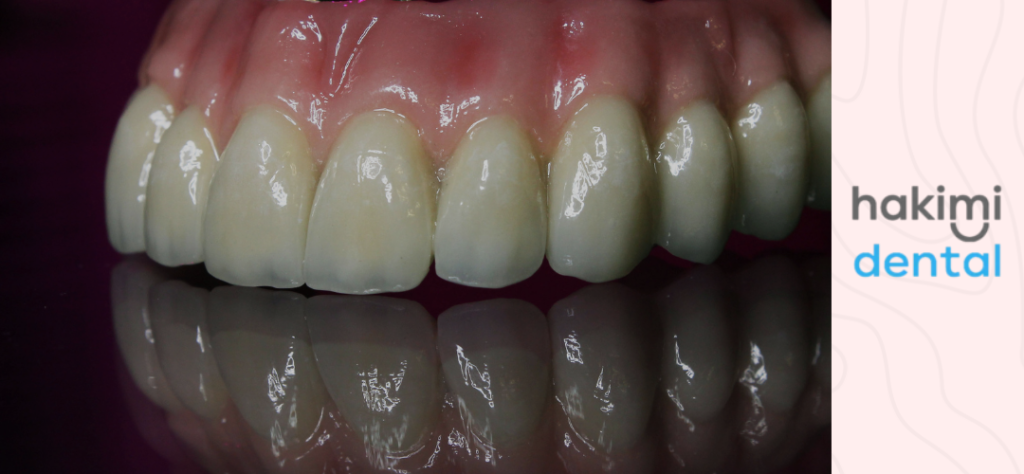Dental Implants vs Dentures: A Comprehensive Guide to Making the Right Choice
Deciding between dental implants and dentures is more than a cosmetic choice; it’s about improving your quality of life. Whether you’ve lost teeth due to injury, decay, or age, the right dental solution can significantly affect how you eat, speak, and smile.
This blog will explain the specifics of dental implants and dentures, helping you understand each option’s advantages, limitations, and costs. We aim to provide a clear, informative guide to assist you in making the best decision for your dental health.

Understanding Dental Implants and Dentures
What are Dental Implants?
Dental implants are a modern solution for missing teeth and are often considered the gold standard due to their durability and function. These are artificial tooth roots, typically made from titanium, which are surgically placed into the jawbone. Over time, the implants bond with the bone, creating a strong foundation for artificial teeth, known as crowns.
What are Dentures?
Dentures are removable appliances used to replace missing teeth and are designed to rest on the gums. They come in two main types: full dentures, which replace all the teeth in either the upper or lower jaw, and partial dentures, which are an option when some natural teeth remain. Made from a combination of metal and acrylic, dentures are custom-fitted to provide the best possible fit and function.
Dental Implants vs Dentures: Appearance and Functionality
Dental Implants:
- Aesthetics: Implants provide the most natural-looking solution. They are crafted to look just like your natural teeth, blending seamlessly with them. Implants can also be customized in terms of colour, shape, and size to match your natural teeth perfectly.
- Functionality: Implants function like natural teeth, allowing for more natural eating and speaking. They don’t require removal for cleaning and don’t shift in your mouth. This stability is particularly beneficial for those who eat a varied diet and engage in activities that require strong, reliable teeth.
- Durability: With proper care, dental implants can last a lifetime. They are made from materials that are resistant to decay and can withstand the pressures of daily use.
Dentures:
- Aesthetics: Modern dentures are far more natural-looking than in the past, but they can still feel bulkier than natural teeth. Advances in denture technology have made them more comfortable and aesthetically pleasing, but they may not provide the same level of natural appearance as implants.
- Functionality: Dentures can sometimes slip when eating or speaking. Unlike implants, they need to be removed nightly for cleaning. This can be inconvenient for some, and the need for adhesives can be a drawback.
- Durability: Dentures typically need to be replaced every 5 to 8 years due to wear and changes in the jaw structure. Over time, the fit of dentures can change, requiring adjustments or replacements.
Oral Health Implications
Dental Implants:
- Bone Health: Implants stimulate the jawbone, preventing bone loss that often occurs with tooth loss. This helps to maintain your facial structure and prevent the sunken appearance that can occur with prolonged denture use.
- Gum Health: Since implants don’t sit on the gums, they do not cause the irritation that can sometimes occur with dentures. They also reduce the risk of gum disease, as they are easier to clean compared to dentures.
Dentures:
- Bone Health: Long-term use of dentures can lead to bone loss, as they do not stimulate bone growth. This can result in changes to your facial structure and necessitate adjustments to your dentures over time.
- Gum Health: Poorly fitted dentures can cause gum irritation and sores. Regular adjustments are necessary to avoid these complications. It is also important to maintain good oral hygiene to prevent infections.
Lifestyle and Practical Considerations
Choosing between implants and dentures often comes down to lifestyle preferences and practical considerations:
- Eating habits: Implants allow for a diet without restrictions, whereas dentures can make eating hard or sticky foods difficult. With implants, you can enjoy a wider variety of foods without worrying about slippage or discomfort.
- Oral hygiene: Implants are maintained just like natural teeth with regular brushing and flossing, whereas dentures require special cleaners. This can be a significant convenience factor for those who prefer a simpler oral hygiene routine.
- Age and health: Younger patients often prefer implants for their longevity and minimal maintenance, while older patients may opt for dentures due to shorter surgical procedures and cost considerations. Health conditions such as diabetes or bone density issues can also influence the suitability of implants.
Dental Implants vs Dentures Cost
Cost is a significant factor when choosing between implants and dentures. Here’s a breakdown of the financial implications:
- Upfront Costs: Implants are more expensive initially. The process involves surgery and several visits to the dentist. However, because they can last a lifetime, the long-term value may outweigh the initial cost.
- Maintenance Costs: Dentures may seem less expensive initially, but they require ongoing maintenance costs, including adhesives, cleaning solutions, and regular dental visits for fit adjustments. Over time, these costs can add up and may make dentures less economical in the long run.
- Insurance Coverage: Dental insurance coverage varies. Some policies may cover part of the cost of dentures but not implants, or they may offer a stipend toward either option. It’s essential to check with your insurance provider to understand what is covered and to plan your budget accordingly.
Making the Right Choice for You
The decision between dental implants and dentures depends on several factors, including:
- Budget: Determine what you can reasonably afford initially and consider long-term costs. While implants have a higher upfront cost, their longevity can make them a more economical choice over time.
- Health Conditions: Certain health conditions may affect your eligibility for dental implants. For example, conditions that affect bone density or healing may make dentures a more suitable option.
- Lifestyle Preferences: Consider how each option will impact your daily life in terms of comfort, convenience, and confidence. Think about your daily routines, eating habits, and how you feel about the maintenance requirements of each option.
Comparing the Procedures
Understanding the procedures involved in getting dental implants or dentures can also help in making an informed decision.
- Initial Consultation: The dentist evaluates your oral health and takes X-rays to determine if you are a good candidate for implants.
- Implant Placement: A titanium post is surgically placed into the jawbone. This may require local or general anesthesia.
- Healing Period: The implant integrates with the jawbone over a period of 3 to 6 months.
- Abutment Placement: Once the implant is secure, an abutment is attached to the post, which will hold the crown.
- Crown Placement: The final step is attaching the custom-made crown to the abutment, completing the restoration.
- Initial Consultation: The dentist assesses your oral health and discusses your denture options.
- Impressions: Moulds of your mouth are taken to create custom-fit dentures.
- Try-In: A preliminary set of dentures is made and fitted to ensure comfort and function.
- Final Dentures: The final set of dentures is created and adjusted as needed to ensure a proper fit.
- Follow-Up Visits: Regular check-ups are necessary to adjust the fit and ensure comfort.
Conclusion
Choosing between dental implants and dentures is a significant decision that affects not only your dental health but your overall quality of life. Dental implants offer a permanent, natural-looking solution that can enhance your smile and improve your oral health. Dentures, on the other hand, provide a less invasive and initially less expensive option. Both choices have their advantages and can significantly improve your confidence and functionality.
Consulting with a dental professional to tailor the treatment to your specific needs is essential. They can provide a comprehensive evaluation and recommend the best solution based on your oral health, budget, and lifestyle preferences. With the right care and consideration, both implants and dentures can provide a successful solution to missing teeth and help you achieve a healthier, more complete smile.
Whether you opt for the durability and natural feel of implants or the flexibility and initial affordability of dentures, maintaining good oral hygiene and regular dental check-ups is key to the longevity and success of your chosen treatment. By understanding the differences, benefits, and costs associated with each option, you can make a well-informed decision that will positively impact your dental health and quality of life.
FAQs
The entire process, from initial assessment to final placement, can take several months. The implant must fuse with the bone in a process called osseointegration, which can take 3-6 months alone.
Once healed, dental implants feel similar to natural teeth. Most patients report no difference in sensation or function. They offer a level of stability and comfort that is very close to that of natural teeth.
Implants have a risk of infection and require a healthy jawbone for placement. Dentures carry a risk of improper fit and mouth irritation. Both options require good oral hygiene and regular dental visits to minimise complications.
Consulting with a dental professional is crucial. They can assess your oral health, discuss your lifestyle and preferences, and recommend the best option based on your specific needs.
Yes, it is possible to transition from dentures to implants. Many patients choose to start with dentures due to cost and later upgrade to implants for a more permanent solution. This transition can be planned with your dentist to ensure the best outcomes.
